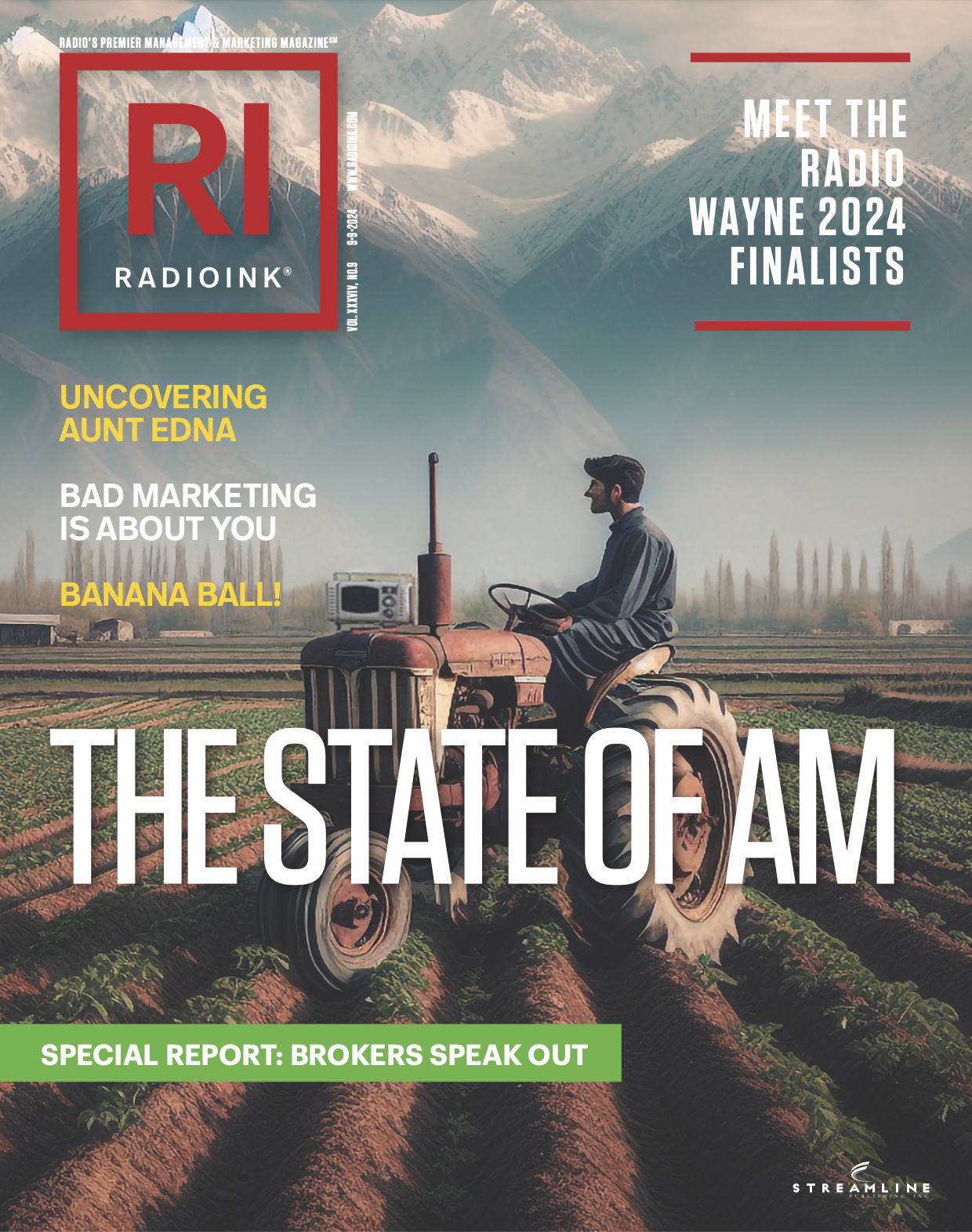
(By Mike McVay) Following a couple weeks of articles, from me and others, acknowledging the challenges that radio faces, it seems to me that we need to put on some “rose-colored glasses” for a moment and look at the other side of radios dilemma. Definition of rose-colored glasses; favorably disposed opinions: optimistic eyes view the world through rose-colored glasses.
We can “gee, ain’t it bad” all day long, but that changes nothing. Many of my articles prompt responses from individuals using fabricated names who take issue with something I’ve written, and they bemoan that radio is not what it used to be, and it will never be what it was. They’re right. Many of their opinions are true, unvarnished criticisms that assess the erosion of radio. What isn’t being pointed out is the many positives of our business, the services we provide, and what vacuum would be created if radio went away.
Until someone is willing to lower their commercial load and charge more for messages, the over commercialization of radio will continue. It doesn’t appear as if anyone has the financial ability or fortitude to suffer short term losses for what could be long-term gains. Radio hasn’t bled bad enough yet, to bite the bullet, and take that step.
We can talk about giving more accountability to local markets, providing more coaching to talent, do more in the way of research with your audience, and promote & market aggressively. Until we stop talking about it and do it, we won’t see change. So, let’s leave that there, filed away for a future discussion when people are finally ready, and do more of what we know the audience wants from us that we can do now and that we do well.
Radio provides localized information. Even in markets where there are voice-tracked and network/syndicated talent. If executed properly, and talent are prepped, you can be connected to your community. Informationally, social media is faster, and sometimes as accurate as radio, but the smart broadcasters aggregate social media and report on what’s trending locally.
Radio entertains. That comes from the music we play, the talk content we present, and the personalities who entertain. The march of time continues to magnify the need for engaging, entertaining, informed and memorable personalities who can attract an audience daily. In many markets, on-air talent are seen as local celebrities, and have an advantage if they are in-market can entertain and connect at a high level.
During the pandemic, we heard of stations losing 40% of their revenue, except in many smaller markets where many stayed flat and a significant number of stations showed revenue growth. Their growth came because of local buying and because of relationships. Radio sells services, products, materials, health, wealth and hope. We move whatever the advertiser wants to move and in many ways smaller market radio has become akin to the community newspaper. Radio does that well.
Radio has great reach. It isn’t what it once was. It never will be back at former levels. Too much competition. Radio has 85% of the USA listening every week. That’s less than in the past, but it still has reach beyond every other medium. It won’t erode quickly, but it will continue to erode. As will all media.
Radio has portability and is ubiquitous. It can be found everywhere. Over the air, online, on smart speakers, smart phones, on aggregated apps and individual station apps. Radio is mostly convenient. “Mostly convenient” are the specific words I use here as, in newer vehicles, it takes some discovery to find the radio hidden deeply in a smart dash. This, as Jacobs Media pointed out in their recent Tech Survey, is why apps have resurfaced as important for broadcasters. People with in-auto Bluetooth listen to what they want, when they want, on their phone. That includes listening to radio. If they have a radio station app, they can simply tap the app on their phone, and the station comes through their radio speakers. Forget that they could just turn on the radio. That’s not convenient enough and it isn’t a developed habit among the younger listener.
Despite all the changes in the last decade in how Americans access music, AM/FM radio is still the most cost-effective advertising medium today. It’s an inexpensive way to reach your existing and potential customers. There are three big variables you want to control when scheduling radio ads: reach, frequency, and consistency. When it comes to music discovery, albeit less important than it once was, it’s in a dead heat with the DSP’s and is the difference between a song being a hit and not. Radio remains the greater driver of creating stars and making hits.
We cannot forget that Companionship is the #1 reason people listen to the radio. That dates back many years to when people listened to music on AM Radio. Radio provides companionship. It’s something we do well. It is something that we can capitalize on without those rose-colored glasses.
What Radio Does Well:
- Delivers local information.
- Connects to a community.
- Entertains, informs, and engages using personalities.
- Sells products, services, materials, health, wealth, fantasy and more.
- Makes hits.
- Provides convenience.
- Is a companion.
Mike McVay is President of McVay Media and can be reached at [email protected]







Colored glass is something that most of us can’t live without. It’s no wonder it has become such a popular accessory for fashion forward people. Colored glasses are used to filter light and create an effect that can change how we see the world.
Colored glasses are a way to see things in a new light. If you find yourself seeing the world through rose colored glasses, that means you tend to perceive things as being more positive than they really are. This can be because of an unconscious tendency to filter information that supports your beliefs.
Great perspective, Mike…as usual.
I feel sorry for those who do not believe in the industry anymore (even though they still work in it!) and would prefer to criticize under an alias than actually come up with productive solutions. They’re usually the ones who tell my students they don’t need to go to college to learn about the biz, just shut up and read the liner notes. Knowledge is power, pal, and if you’re not learning from those who have honed their skills and who have taught others how to use their own, you won’t grow.
You’re constantly growing, Mike, and inspiring others to do the same. Thank you.
Mike’s points, which are presented in a positive light, express what radio CAN do well. While in cases where it doesn’t, these points are great differentiators in where radio has great opportunity to shine in areas not (yet) found elsewhere.
What Radio Does Well:
•Delivers local information.
It absolutely should be doing this. This information needs to be non-generic, timely and delivered in a way that should feel real-time – not canned. This includes everything, including the stuff that “radio people” say you shouldn’t do on radio, “because you can get it on your phone.” In other words, if I’m sitting listening to a radio station and about to get wiped out by a tornado, it would be nice if the radio station said there’s a tornado on the way. Does it? Certainly that, and other things are available on your phone as utilities, but there’s just something about someone talking to you and telling you it as a friend and companion.
•Connects to a community.
Radio is fundamentally a local business. It needs to be talking about things happening in the community, but also creating, leading and taking part in those things.
•Entertains, informs, and engages using personalities.
Think topical, plugged in and visible leaders. No one said everything has to be live, but it should be local, engaging and activating. The people on the air should be ambassadors and influencers, as well. That leads to revenue, as well.
•Sells products, services, materials, health, wealth, fantasy and more.
Does so by creating experiences – versus just a spot schedules.
•Makes hits.
A hit might be a song, but a hit might also be leading a community effort to help a family who has lost their home, or creating and giving an experience that one can’t buy. In other words a “hit” with the listeners.
Provides convenience.
•If this means a place to connect local in one place, great.
Is a companion.
•Radio can be an excellent companion. All the great streaming and playlist options in the world can be terrific utilities for collections of songs (playlists). However, don’t mistake these utilities for the companionship radio can provide. I am very happy to be able to skip a song I don’t like on a streaming service, but couldn’t care less about that in radio, because radio isn’t a jukebox utility (or it shouldn’t be). The only reason people compare radio to these other things is that radio has tried to chase these things, when it shouldn’t. Think about ancient history when the iPod came out. Radio freaked out and tried to be an iPod. Radio lost the battle of being an iPod to the iPod! Because the iPod was a better iPod than radio! Radio is losing and will lose two streaming services by trying to be Spotify, because there already is a Spotify and it’s better at being Spotify than radio is it being Spotify. Spotify is a great jukebox. Radio isn’t – yet has more game than Spotify if you don’t define radio as Spotify. So stop doing it!
Give me a great local experience and the music doesn’t fully make or break things. Radio wasn’t meant to be built as a playlist, but a local and personal experience. That local and personal experience might actually include 15 to 18 songs per hour, and even though music makes up most of the time, what’s between the music is what makes radio an experience, unique, different and local. That makes it more personal.
If one can’t tell that difference between the two, they need to move on to a different profession.
As far as these great attributes of radio are concerned, it’s important to self-examine as you whether these are things radio currently does well or can do well.
There’s admittedly more that radio must do better from this list than it does. That’s the beauty of the list, though. These are things for which radio needs to be “famous,” again.
For those who are so negative about the business, (and I’m assuming those who comment are currently in the business):
Bitterness is a bad look.
Lead, follow or get out of the business – and move to something else that will make you more happy!
Life is too short.
Darwinism is alive and well. Companies that aren’t good at this, won’t survive. In fact, they’re not.
Bright visionaries, who see a future, create great audio-based local experiences and drive revenue as a result, will be the winners.
This will sort itself out, and the thought of that is very exciting!
Thanks Mike, for the inspiration.
Thanks Tom. Great thoughts and comments. Your additions are most welcome.
The reason why people create fake names is because of the “good ol’ boys” club that is scared of honest criticism. So, inferring that people are weak because they don’t want their perspective to cost them a career is shallow. I would recommend to all radio employees that your honest thoughts on the future of the business is a liability. Stay quiet and plan for the future. Folks, these companies have not been listening to the experts (or the audience), for years. They won’t listen to you, either.
The CEO’s only care about the board of directors.
The OM’s only care about keeping their job.
The PD’s only care about keeping their job, voice-tracking their boring shift and getting hooked up by the record labels.
The MD is also the PD.
The GM only cares about what fire to start to make them “not” look like the problem.
The GSM thinks that they should be the GM.
The Promo Dir. thinks they should be the PD.
The Digital PD has no idea what their job role is, but it says “digital” so it must have some staying power.
Great article, Mike, and a great counter-balance to the naysayers. Can I add that radio is “free” (yes, there are too many commercials, but stations don’t send you a bill at the end of the month)? It’s a huge benefit stations don’t “weaponize” enough, especially in an inflationary environment where those subscription fees keep adding up.
Imagine this promo: RADIO- We won’t send you a bill, but we can only play one song at a time, and if you don’t like it, tough, you cannot skip it. We, in fact, are not customizing this experience for you, more so for a person that we think you might be, or should be. Also, for 24 minutes an hour, we play advertisements that we have no idea if they serve your needs, or even the clients, but we got paid. Always remember: we aren’t sending you a bill.
Who, on EARTH, would ever pay for that type of service? By the way, no one gets a “bill” anymore… Jeez.
Diana:
Thanks! You said it.
Let me know when I can again present to your class.
Thank YOU Fred.
Well said.
So much of the negative comments on here are just wailing and gnashing of teeth, and criticism that is not “constructive”. These whiners more often than not do not offer solutions.
I also wonder, Mike, how many of them don’t even work in the industry, and hence, don’t really offer genuinely informative opinion?
There is still much positive that comes from local radio. Thank you for reminding a lot of folks who need it.